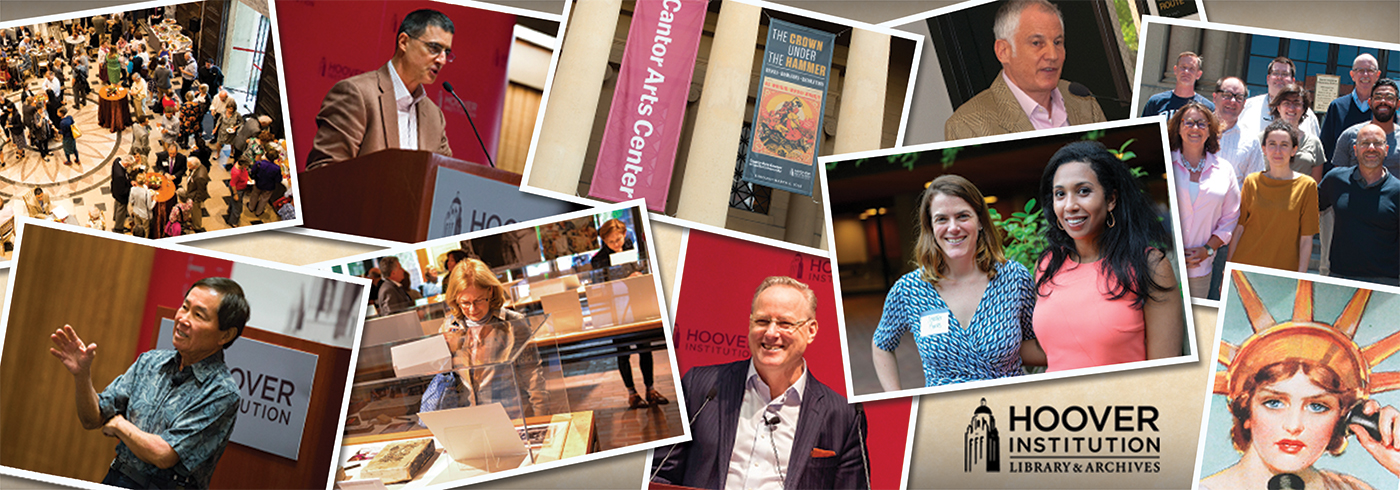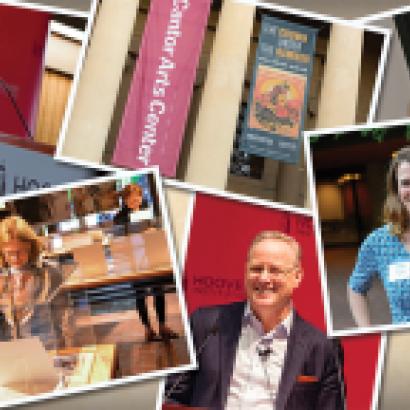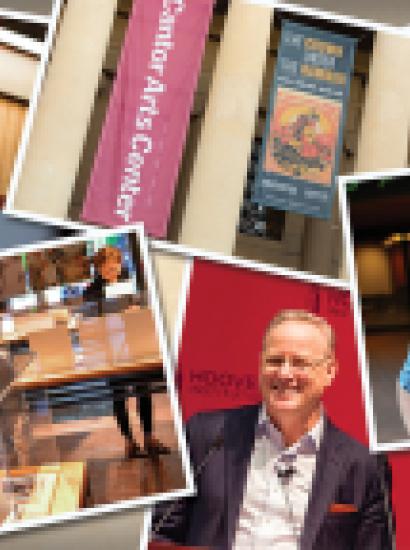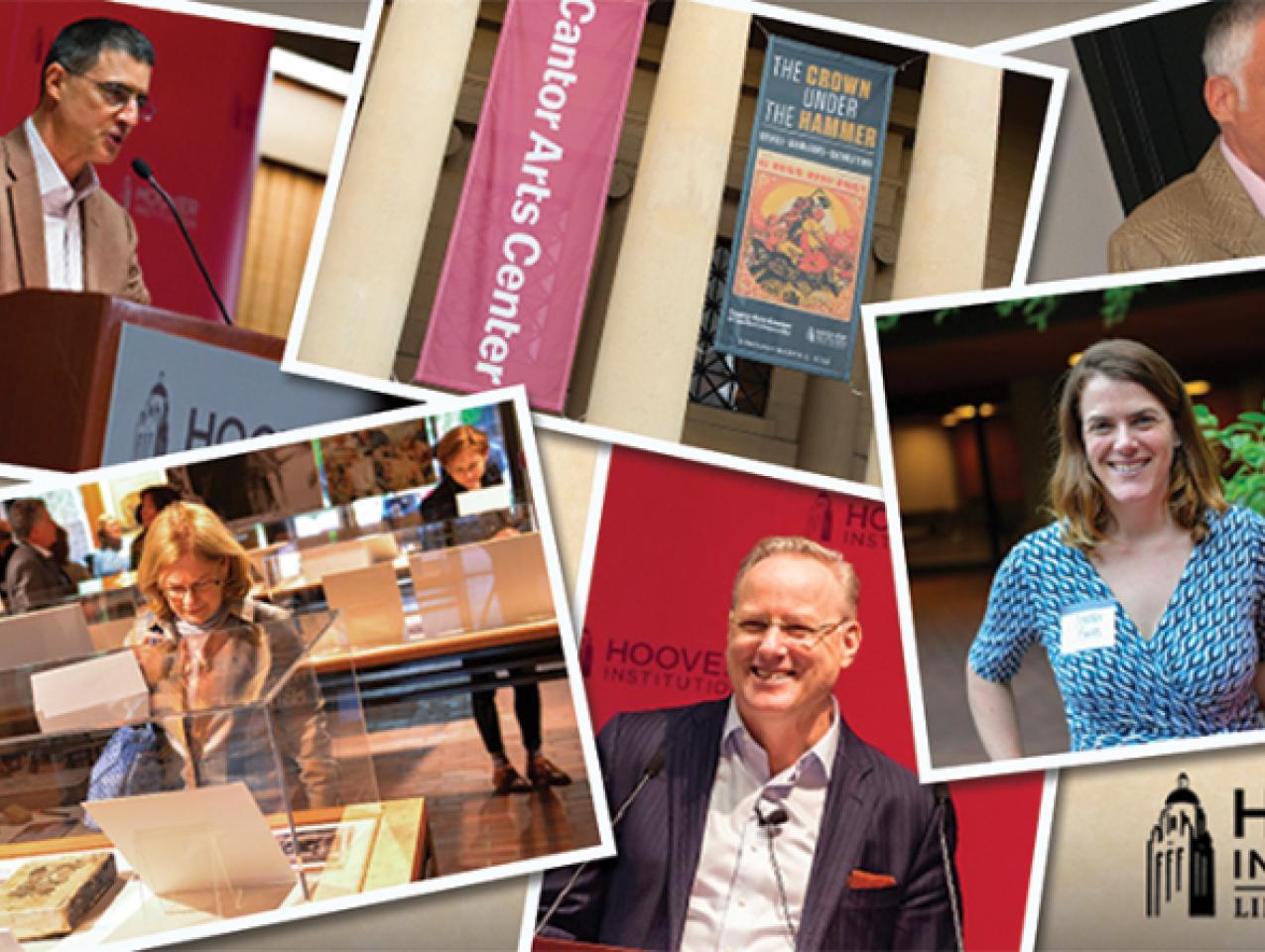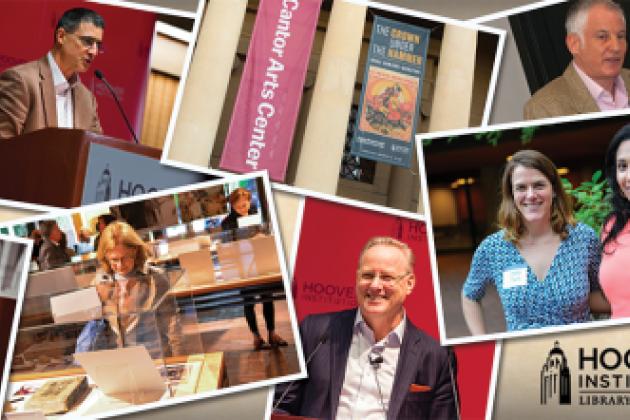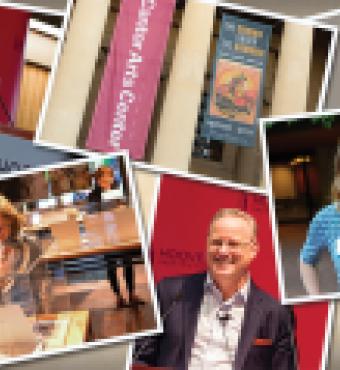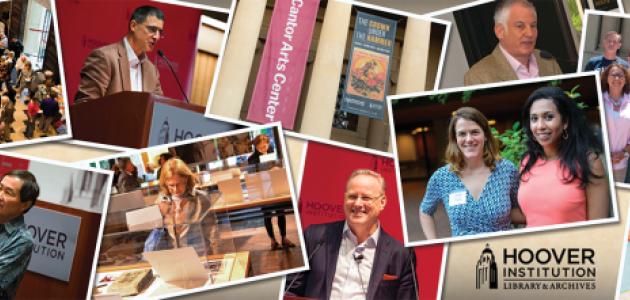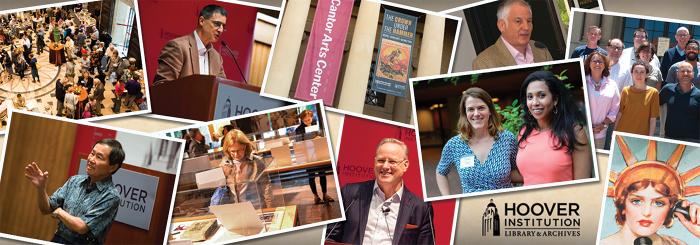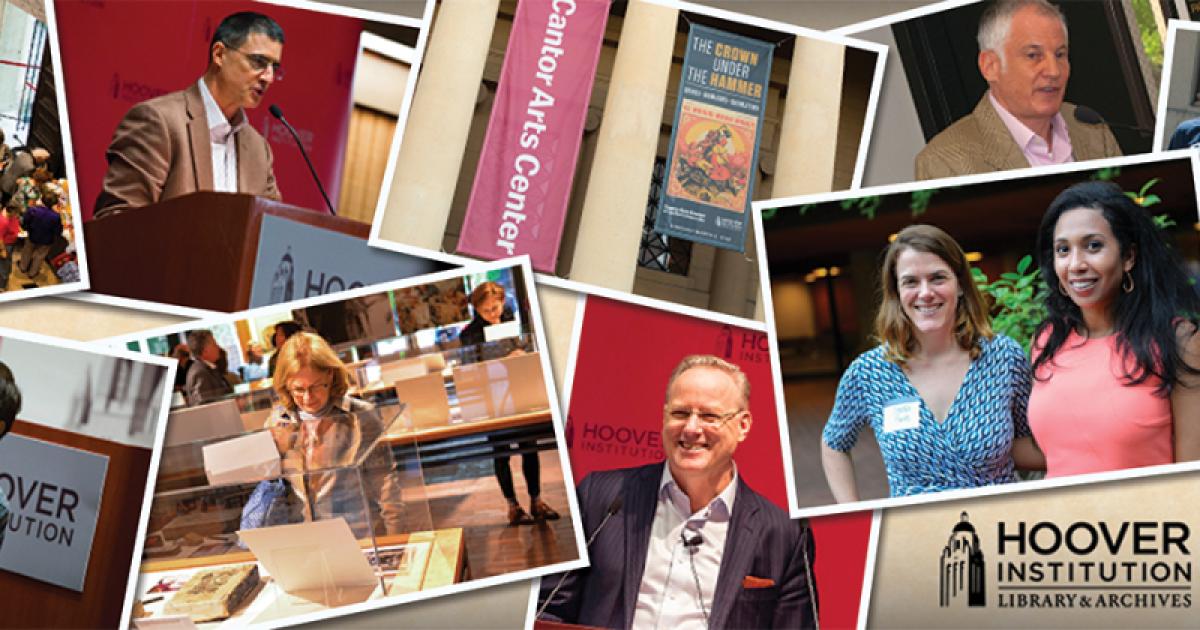The year 2017 has seen amazing growth in the Library & Archives’ efforts to acquire, preserve, and make available the world’s most important materials on war, revolution, and peace across the globe. Digitization initiatives, exhibitions, events, workshops, scholarship, and educational programs continue to make our collections available to scholars, students, policy-makers, and a broad public interested in the meaning and role of history.
This year we expanded access to our collections by launching a digital portal containing thousands of images from our collections, and introduced a new software program, Aeon, to serve the 2,500 scholars who visited our reading rooms. Nearly 7,000 visitors enjoyed our summer exhibition, Weapon on the Wall: American Posters of WWI, and approximately 600 students attended classes in the archives. As can be seen by the long list of student awards and achievements below, our Silas Palmer fellowship program continues to promote academic excellence. The year 2017 has also been a year of cross-campus collaboration: in the summer we teamed with Stanford’s Center for Russian, East European and Eurasian Studies (CREES) to host a five-day professional development course for educators and in the fall we joined Cantor Arts Center in marking the centennial of the Russian Revolution through the joint exhibition The Crown under the Hammer: Russia, Romanovs, Revolution. As always, we continue to acquire documents vital to the understanding of history and to promote scholarship based on our collections.
Primary documents are the heart and soul of the historical enterprise. No historian of the modern world can enter the Hoover archival, newspaper, and library collections without hyperventilating at the depth and breadth of the magnificent materials that are held there. For Stanford undergraduates and graduate students, for Hoover scholars and Stanford professors, indeed for the world of scholarship as a whole, the Hoover Library and Archives provide an absolutely unique and irreplaceable resource.
Norman M. Naimark, Robert and Florence McDonnell Professor of East European Studies, Stanford Department of History Senior Fellow, Hoover Institution
Highlights of the year 2017 at the Library & Archives include:
Expanding Digital Initiatives
- This year the Library & Archives launched its new digital collections portal. The site contains more than 55,000 digitized posters, photographs, documents, sound recordings, and moving images from Hoover collections, with new items frequently added. The portal will allow remote users from around the globe to access the rich collections at Hoover for research and educational purposes.
- The Library & Archives also announced the launch of The Collected Works of Milton Friedman, the largest collection of Milton Friedman's work available on the internet. This new online resource features over 1,400 digital items by and about the Nobel Laureate and Hoover fellow, including every episode of the PBS series Free to Choose, 206 episodes of Friedman’s weekly Economics Cassette Series, sound and video recordings of the lecture series Milton Friedman Speaks, and hundreds of Friedman’s op-eds published in Newsweek and the Wall Street Journal. By providing free, convenient, and comprehensive access to these resources, the Hoover Institution allows for the continued study and appreciation of the work and life of one of the twentieth century's most influential economists.
- On January 25th, representatives of Hoover Institution Library & Archives and three units of the Polish Ministry of Culture and National Heritage met in a ceremony celebrating an agreement to provide free digital access to some of Hoover’s most important materials about Soviet totalitarianism and its legacy. With the support of Poland’s Central Archives of Modern Records, National Digital Archives, and Witold Pilecki Center for Totalitarian Studies, thousands of testimonies of Polish survivors of the Soviet Gulag preserved in Hoover’s Władysław Anders collection will be given full digital access in both the original Polish and English translation. By making unique testimonies of the Gulag experience readily available to academics, students, and policy-makers, this landmark digital hub will be a premier online resource for the study of authoritarianism.
- Hoover Archives digitized and made available more than 3,700 pages of autobiographical sketches written by members of the Nazi Party. The documents are from the Theodore Abel papers. During the 1930s Abel, a sociologist at Columbia University, sponsored a contest “for the best personal life history of an adherent of the Hitler movement” and received 683 responses, which he used for a landmark study of authoritarian regimes and their ideology. The collection represents one of the most innovative and insightful attempts to understand Nazi psychology in the 1930s.
- Hoover established an ongoing partnership with the Library of Congress, the U.S. National Archives, and the Wilson Center to create the Radio Preservation Task Force Increasing awareness, discoverability, and access to Cold War communication materials is the goal of the project which includes symposia, publishing opportunities, and a web portal among its initiatives. Hoover’s Radio Free Europe/Radio Liberty collections figure prominently.
- For the first time since acquiring the collection in 2001, the Hoover Institution Library & Archives is hosting, free-of-charge, full-length Firing Line videos online through its digital collections website and YouTube channel. With a roster of guests including Ronald Reagan, Margaret Thatcher, Milton Friedman, Groucho Marx, Tom Wolfe, Jack Kerouac, Woodward and Bernstein, Barry Goldwater, Joan Baez, Hugh Hefner, and others, Firing Line serves as one of the most important and complete records of political and cultural movements in twentieth-century America.
- Library & Archives announced that more than 4600 audio recordings from the Commonwealth Club of California records are now available through our digital collections portal, including 129 recordings of lectures delivered by Hoover fellows. The collection contains sound recordings of such memorable moments as Dan Quayle delivering the famous "Murphy Brown" speech and Enron director Jeffrey Skilling receiving a pie to the face at the podium.
- New digital materials from the Friedrich A. von Hayek papers were made available to researchers for the first time. Digital archivists recovered files created by Hayek’s longtime secretary, Charlotte Cubitt, from 39 3.5 inch floppy disks. The files contain notes made by Cubitt during the course of her work and document Hayek’s meetings, travel, and daily activities from the late 1970s until Hayek’s death in 1992. Cubitt’s accounts will give a unique look into Hayek’s life and work during his final years.
- We announced the online release of the sound recordings in the Mont Pèlerin Society records. These recordings contain the proceedings of the Berlin (1956), Princeton (1958), Oxford (1959), and Kassel (1960) meetings of the society. In these recordings one can hear the voices and arguments of Friedrich A. von Hayek, Milton Friedman, Ludwig von Mises, Felix Morley, and debates on freedom, economics, healthcare, the welfare state, and many more topics. Previously only available in our reading room, these recordings are now available for free, immediate access by anyone around the world.
- More than fifty lectures by economists, historians, and other academics at the Institute for Humane Studies from 1961 to 1977 were made available online. Formed to expand understanding of human affairs and freedom, the Institute for Humane Studies invited speakers such as Milton Friedman, Friedrich von Hayek, Arthur Ekirch, Arthur Kemp, and Thomas LeDuc to explore monopoly and competition, the role of government and the military, US intellectual history, and many other topics.
- Photographs and documents from Hoover's Joshua Powers collection were made available online through our digital collections portal. The materials relate to the life and career of Homer Lea, a Stanford graduate who served as military adviser to Sun Yat-sen and was the author of the influential book The Valor of Ignorance. The materials provide excellent sources for understanding the revolutionary movement in China between 1900 and 1920.
- Newly digitized photographs from the Ron Kovic papers were made available to the public for the first time. The images were taken by photographer Roger Steffens, a close friend of Kovic, and capture on the period when Kovic was writing the manuscript for his Vietnam War memoir, Born on the Fourth of July. These images offer a personal glimpse into the life and creative process of a prominent figure in the anti-Vietnam War movement.
- Hoover joined the digital content provider Adam Matthew and renowned archival repositories across the globe in forming a new online digital resource for the study of health and medical services during wartime. Medical Services and Warfare: 1850–1927 gathers material from multiple conflicts and institutions to build a picture of the experience and development of medical practice as influenced by the wars of the late nineteenth and early twentieth centuries. The collection draws heavily from Hoover's rich holdings on WWI, particularly holdings related to the Red Cross.
- Materials from Hoover Archives' rich collections on modern China were featured in a new digital platform called Madspace, created by Cécile Armand, a postdoctoral scholar at Stanford's Department of History and Center for Spatial and Textual Analysis (CESTA). The platform presents an interactive spatial history of advertising in modern Shanghai between 1905 and 1949, incorporating a wide range of primary sources, including municipal and business archives, personal papers, press advertisements, professional handbooks, original sketches, street photos, and videos.
New Acquisitions
- In 2017 Library & Archives added new materials to the collection of Henry S. Rowen (1925-2015), a senior fellow at the Hoover Institution as well as a professor of public policy and management at Stanford University's Graduate School of Business and a member of that university's Asia/Pacific Research Center. An expert on international security, economic development, and high-tech industries in the United States and Asia, Rowen served on the Presidential Commission on the Intelligence of the United States Regarding Weapons of Mass Destruction in 2004-5. He was assistant secretary of defense for international security affairs in the US Department of Defense from 1989 to 1991, and served as president of the RAND Corporation from 1967 to 1972. The newly available materials in Rowen's archive will give researchers new and valuable insight into the United States' Cold War policies concerning the Soviet Union and the nuclear arms race.
- Hoover Library & Archives received a never before published cache of letters written between Hoover fellow and Nobel Prize-winning economist Milton Friedman, his wife and collaborator Rose Friedman, and New York publisher William Jovanovich of Harcourt, Brace, and Jovanovich, Inc., publishers of Milton Friedman’s 1980 bestseller, Free to Choose. The letters not only illuminate the close personal relationship between the Friedmans and their publisher, but reveal Milton Friedman's early praise for the works of Hoover fellow Martin Anderson, whose work he lauded as "first-rate" and "necessary."
- The family of Harold Agnew, a scientist instrumental to Project Alberta (“Project A” ) of the Manhattan Project, recently donated new material relating to the atomic bombings of Nagasaki and Hiroshima during World War II to Hoover Archives. These new items complement the original camera footage of the bombings (the only known moving images of the event in existence), which was donated to Hoover by Agnew in 1980. The entire collection is open and available for research as part of the Harold Agnew papers. The new increment consists of a scrapbook belonging to Harold Agnew, which includes personal items such as his travel orders to Tinian Island, photographs of crew and other Project A members at the base, as well Agnew’s special passport that was issued for the project, among other never before seen documentation.
- Hoover Library & Archives added a remarkable piece of memorabilia to the collection of Hoover Senior Fellow and former U.S. Secretary of State George P. Shultz: Mr. Shultz’s cabinet chair, which bears plaques for the four different US cabinet positions Mr. Shultz held from the 1960s to the 1980s. Shultz served as Secretary of Labor, Director of Management & Budget, Secretary of the Treasury, and Secretary of State. Only one other person in American history, Elliot Richardson, holds the distinction of having held four different US Government Cabinet positions. The Shultz cabinet chair is currently on display in the Annenberg Conference Room at the Hoover Institution.
- Hoover expanded its Japanese and Japanese Diaspora collections with the acquisition of a complete, handwritten Japanese translation of the Bible that was the life work of Masuo Kitaji (1897-1973), a Bay Area Japanese American officer in the Salvation Army and an internee at the War Relocation Authority Center in Poston, Arizona, during WWII. The two-volume Bible, lavishly illustrated with Kitaji's drawings and notes about his life and Christian vision, is both a remarkable manuscript and a valuable record of the experiences of Japanese Americans during the latter twentieth century. You can read more about the Bible and an interview with Kitaji's niece, Laura Dominguez-Yon, in a recent article in the San Jose Mercury News. The digital images will be made available at Hoover’s digital collection, courtesy of Monterey District, California State Parks.
- Hoover acquired the papers of Bai Chongxi, one of the greatest military strategists in Chinese history. In 1946 Bai was appointed minister of national defense and assisted Chiang Kai-shek in waging war against the Chinese Communists. His papers include official files at different stage of his military and political careers, correspondence between Bai and important Nationalist Chinese government officials, family letters and correspondence, and personal diaries. The collection also includes more than a thousand rare photographs that document the general's military and political careers at different stages of his life.
- Hoover Archives received a group of original documents of the Poglavnik (head of government) of the fascist Ustaše regime of the Independent State of Croatia, a quasi-protectorate of Hitler’s Germany and Mussolini’s Italy. The collection focuses on official appointments and commendations made by the order of Poglavnik Ante Pavelić (1889–1959) and his subordinates. The Ustaše were members of the Croatian Revolutionary Movement, an ultranationalist, anti-Serb organization that in the pre–World War II period engaged in terrorist activities against the Yugoslav state. The new acquisition complements other Hoover collections pertaining to the former Yugoslavia, including the papers of Jozo Tomasevich, Milovan Djilas,Vicko Krstulović, and Časlav Nikitović.
- Library & Archives received the papers of Marek Latynski (Łatyński), who worked for Radio Free Europe’s (RFE’s) Polish broadcast service for nearly two decades and was its director during the final three years of communist Poland, 1987–89. His papers are a significant complement to the extensive documentation of RFE and its Polish service available at Hoover.
- Hoover Archives acquired the papers of Payson Dennis Carter, an American who worked in the USSR as a communications engineer between 1933 and 1937, helping lay telegraph and telephone lines between Moscow and Leningrad. As a member of the Friends of the Soviet Union after his return to the U.S., “Comrade Carter” was active in speaking to church groups in the American South–making him a prime target of McCarthyism during the Red Scare. The collection complements Hoover's strong holdings on communist activities in twentieth-century America.
- Documents, correspondence, and writings of General Wacław Stachiewicz (1894–1973), the chief of staff of Poland’s armed forces during 1935–39, were received by the Hoover Archives. Stachiewicz was largely responsible for Poland’s defensive preparations and the subsequent armed response to the invading armies of Hitler’s Germany and Stalin’s Russia in September 1939, the first month of World War II.
- The papers of one of the most distinguished experts on Warsaw Pact affairs of the 1970s and 1980s were added to the Hoover Archives. The donor, Colonel Michael Sadykiewicz, was formerly one of the highest-ranking military strategists of Communist Poland. His papers are a significant contribution to Hoover's strong holdings related to Poland under the Soviets.
- Hoover’s Polish archival collections, the largest and most comprehensive holdings on twentieth-century Poland outside Poland, now include the papers of another key figure in the process of transforming of the country from a Soviet satellite ruled by an authoritarian communist regime into an independent democratic republic. Stanisław Ciosek’s papers and photographs document mostly the years 1980–96, his tenure as minister of labor as well as a Central Committee and Politburo member, endeavoring to contain the rise of the Solidarity trade union movement, followed by nearly seven years of work for his erstwhile adversaries as the new Poland’s ambassador to Moscow.
- Library & Archives acquired two photograph albums of Stefano Braccio, a lieutenant in the engineer combat battalion of the Italian Expeditionary Corps participating in the German invasion of the Soviet Union (Operation Barbarossa). The albums provide a complete visual record of his unit’s operation in the Ukraine, from the crossing of the Soviet frontier in July 1941 to the end of Italian troops’ participation on the Eastern Front in February 1943, after the Axis forces’ defeat at Stalingrad.
- Hoover Archives acquired the papers of Tom Killion, a leading scholar on the history of Eritrea. In March of 1988 Killion traveled in the liberated zone of Eritrea with the Eritrean People's Liberation Front, witnessing the battle of Afabet and reporting on it for the Los Angeles Times. He went on to have a celebrated career as an academic and a woodcut artist. The recently acquired Killion collection includes sound recordings of his interviews with various Eritrean national and labor leaders, including revolutionary Woldeab Woldemariam.
- Hoover Archives opened the collection of Steven Grant, an expert on Russian culture and history who worked for the United States Information Agency from 1980 until 2004, serving as Assistant Cultural Affairs Officer at the US embassy in Moscow from 1982-85. Grant's collection contains a wealth of material on public opinion polling during the late Soviet period. The Steven Grant papers form an excellent complement to the Boris Grushin papers, Ivan London papers, Alex Inkeles papers, and the Audience Research series of the RFE/RL corporate records, all of which focus on public opinion polling and sociological research in the USSR and Russian Federation.
- A substantial collection of photographs and publications of the Czechoslovak Legions on the Western Front and in Siberia was added to Hoover's holdings. The most valuable part of the collection is made up of Czech brochures and periodicals published in Siberia and the Far East during 1918–20. This collection is complemented by Hoover Archives’ existing pictorial holdings on the Czechoslovak forces during World War I: General Radola Gajda’s album, the Eric Steinfeldt photographs, and items in the World War I Pictorial Collection.
Exhibitions
- On April 5 Hoover opened the exhibition Weapon on the Wall: American Posters of World War I, which marked America’s entry into the First World War by exploring one of the most powerful tools the country used to persuade its public to support and sustain the war effort: the poster. Drawing from the Hoover Institution’s world-renowned archive of more than 130,000 posters, the exhibition showcases the boldly graphic environment of 1917–18 and traces the pictorial treatment of the country’s most dire concerns, including enlistment, fear of the enemy, food conservation, morale on the home front, women in the workforce, and fund-raising for victory.
- In May Library & Archives joined the Hamid and Christina Moghadam Program in Iranian Studies at Stanford in celebrating their tenth year. At a celebration dinner held at Stanford's Faculty Club, Library & Archives furnished a display of newly acquired materials from the archives of Ardeshir Zahedi, who served as the Iranian ambassador to the U.S. during the last years of the Shah's reign.
- On October 18th Hoover and Cantor Arts Center opened the joint exhibition The Crown under the Hammer: Russia, Romanovs, Revolution. Marking the centenary of the Russian Revolution of 1917 this exhibition examines the political, social, and cultural upheavals that transformed Russia in the final decades of the Romanov dynasty and the first years of Soviet Communism. The dual-site exhibition features a wide variety of art objects and documentary material. Paintings and posters, photographs and films, rare books and decorative art objects alternately evoke the lost world of Russia’s old regime and hint at the utopian future imagined by the nation’s revolutionaries.
- This summer Library & Archives joined Hoover's Johnson Center in Washington DC for the launch of an Unpacking History summer series–a series of lectures on history and policy, featuring displays of archival materials from Hoover collections.
- The New–York Historical Society Museum & Library opened a new exhibition on the Vietnam War featuring materials from Hoover's We Supported Our Men in Vietnam records, New Left collection, Chi Pham Phuoc letters, John Levinson papers, and the Young Americans for Freedom records.
Publications and Scholarship
- In November Hoover senior fellow and military historian Victor Davis Hanson released The Second World Wars: How the First Global Conflict was Fought and Won, a volume that features dozens of photographs from Hoover's rich pictorial holdings on WWII. Drawing on 3000 years of military history, Hanson's new work examines how combat unfolded in the air, at sea, and on land to show how distinct conflicts among disparate combatants coalesced into one interconnected global war.
- Library & Archives proudly announced the publication of Hammer, Sickle, and Soil: The Soviet Drive to Collectivize Agriculture, by Dr. Jonathan Daly, professor of history at the University of Illinois and a past participant in Hoover's Workshop on Authoritarianism and Democratic Breakdown. This Hoover Press publication features over sixty Soviet propaganda posters from Hoover's world-renowned collection. With detailed research and rich illustration, Hammer, Sickle, and Soil tells the story of Stalin’s brutal transformation of millions of family farms throughout the USSR into 250,000 collective farms during the period from 1929 to 1933.
- University of Oklahoma professor and Hoover Archives researcher Emily Johnson translated and edited a fascinating collection of letters written by Arsenii Formakov, a Latvian Russian poet, novelist, and journalist, whose archives are held at Hoover. This correspondence, which Formakov mailed home to his family in Riga during two periods of imprisonment in the Soviet gulag, provides readers with a firsthand account of the workings of the Soviet penal system. An excerpt of these compelling letters was featured in the April edition of Harper's.
- The publication El Exilio de Perón: Los Papeles del Archivo Hoover, a collection of essays produced by participants in Hoover's 2015 international bilingual conference “Juan Domingo Perón in Exile,” was published to wide acclaim, and was featured in media outlets in Argentina and beyond The new publication explores the life, politics, and legacy of Argentina's most famous leader from the viewpoints of scholars who attended the conference and consulted the Perón Papers at Hoover Archives. Coordinated with Stanford’s Center for Latin American Studies, the conference was directed by Hoover’s curator for Latin America Herbert S. Klein and Professor José Carlos Chiaramonte of the University of Buenos Aires. Klein and Chiaramonte, leading authorities in Latin American Studies, also edited the book.
- Hoover Press published Milton Friedman on Freedom, a collection of essays written by Milton Friedman and edited by Hoover fellow Robert Leeson and Library & Archives Director Emeritus Charles G. Palm.
- Author and historian Kenneth Whyte, a recent speaker in the Library & Archives History & Policy series, released his new biography of Herbert Hoover, Hoover: An Extraordinary Life in Extraordinary Times. Drawing from collections held at the Library & Archives and elsewhere, Hoover traces the life of the former president and Hoover Institution namesake through his Iowa boyhood, education at Stanford, successful mining career, WWI-era humanitarian aid work, presidency, and post-WWII diplomatic endeavors.
Student Awards and Achievement
- Alina Utrata, one of Hoover's 2017 Silas Palmer research fellows, won a coveted Marshall Scholarship, which will allow her to pursue a master’s degree in conflict transformation and social justice at Queen’s University Belfast. Alina, a Stanford senior majoring in history and law, with a minor in human rights, has used Hoover collections both as a Silas Palmer fellow and as a student in classes taught by history professor Allyson Hobbes and history professor and Hoover fellow Norman Naimark. Utrata described the Silas Palmer fellowship as "a fantastic opportunity to be able to utilize the resources that Hoover offers . . . I had an incredible experience working with primary materials in the archives."
- Library & Archives Silas Palmer fellowship alumna Victoria Saenz won a Fulbright scholarship to research pro- and anti-establishment music under military rule in Brazil during 1964-72. Victoria worked at Hoover Archives during all four years of her undergraduate education at Stanford.
- Silas Palmer fellowship alumni Benjamin Musachio and Alina Utrata were named 2016-17 undergraduate research fellows of the Stanford Humanities Center. Musachio and Utrata were joined by other Stanford undergraduates who had used Hoover collections for their research.
- Stanford undergraduate researcher Nathan Hausman, won the Stanford History Department's 2017 Jerry Anderson Award for his essay "Palestinian Resistance to Iraq's Invasion of Kuwait: A Reconsideration of Palestinian Collaboration with the Ba'th Party." In their introduction to Hausman's essay, Stanford history professors Keith M. Baker and Ian P. Beacock wrote, "The Ba’ath Party Archives, held at the Hoover Institution and only recently made available for scholarly research, form the evidentiary spine of Nathan’s outstanding essay. The discovery of untapped sources is an exciting prospect for any historian." Based on his research at Hoover, Hausman has secured funding through Stanford's Abassi Program in Islamic Studies to continue his research in Kuwait.
- Silas Palmer Fellow Samuel Clowes Huneke’s research on Nazi Germany using Hoover Archives was featured in Stanford News and The Stanford Report. Huneke, a doctoral candidate in the Stanford history department, has analyzed police files from the 1940s that illuminate the limited toleration some lesbians found during the Nazi regime. The article notes that "Huneke’s research on alleged violations of same-sex relations laws in Nazi Germany adds a level of nuance to existing scholarship."
- Stanford undergraduate Anatole Schneider's summer research on the Cold War at Hoover Library & Archives was featured in a Stanford News article.
Programs, Workshops, Lectures, Events, and Student Engagement
- Throughout 2017 Hoover staff taught nearly forty classes for Stanford and local community schools, with a wide range of topics including
- The History of the Cold War
- The First World War in Literature and History
- The Rhetoric of Radio
- Social Movements and Song
- Soviet Propaganda
- Sex, Race, and Nazism in 20th-century Germany
- The History of Shanghai
- Eastern European Women and War
- Cartography and Human Geography
- The History of the Supreme Court
- In April Library & Archives hosted the second annual workshop of the Leverhulme Trust-funded project "Hunger Draws the Map! Blockade and Food Shortages In Europe, 1914-1922," which is based at the University of Oxford and co-organized by Hoover Visiting Fellow and Oxford Lecturer Mary Cox. Members of the network are working together to research and publish studies on the impact of food shortages on European and Ottoman societies during the First World War. In addition to discussions and meetings, members of the Hunger Draws the Map network spent a week doing research in the rich collections at Hoover Archives.
- During the summer Hoover Archives opened its doors–and vaults of historical treasures–to congressional staffers visiting California as part of The Stuart Family Congressional Fellowship Program, organized by the Hoover Institution in Washington, DC. While visiting the archives, congressional staffers viewed items such as the original strike orders for the dropping of the atomic bomb on Hiroshima, the law school journals of former Supreme Court justice William Rehnquist, and WWII survival kits.
- On May 11 Hoover welcomed Dr. Alvin Felzenberg to lecture as part of the Hoover Library & Archives History & Policy speaker series. A communications expert and a former member of the 9/11 commission, Felzenberg is also the author of A Man and his Presidents: The Political Odyssey of William F. Buckley Jr., a recent Yale University Press publication that makes extensive use of Hoover Firing Line collection. During his talk Felzenberg discussed how Buckley's early experiences at Yale University informed his later Cold War politics and his relationships to the many presidents he interviewed during his long tenure as host of Firing Line.
- During the last week of June Library & Archives brought together scholars from across the globe for its fourth annual Workshop on Political Economy. Organized by Stanford history professor Jennifer Burns, the workshop invites researchers from diverse fields to study and discuss the history of economic thought using the archives of such notable thinkers as Karl Popper, Milton Friedman, and F.A. Hayek. This year the workshop welcomed Leah Wright Rigueur, Assistant Professor of Public Policy at Harvard University and author of The Loneliness of the Black Republican: Pragmatic Politics and the Pursuit of Power, who delivered a keynote address on the history of African American involvement with the GOP.
- Michael Flamm delivered a lively talk on his recent book In the Heat of the Summer: The New York Riots of 1964 and the War on Crime, for which he researched in the Denison Kitchel and Elizabeth Churchill Brown papers at Hoover. Flamm's book is the first expansive history of the New York riots of the summer of 1964, and outlines how this touchstone of the Civil Rights Movement influenced the policy of LBJ, the strategies of major civil rights leaders, and the politics of the New York City police force.
- In July Hoover welcomed an international roster of scholars for its fourteenth annual Workshop on Authoritarianism and Democratic Breakdown. Organized by Hoover fellows Stephen Kotkin and Paul Gregory, the workshop focuses on the history of democratic breakdown and the rise of authoritarian regimes to understand why they come into being, how they work, what their legacies are, and how they can be challenged and freedom advanced. This summer's participants enjoyed lectures by renowned historians as well as two weeks of research in Hoover Archives, studying collections pertaining to politics and human rights issues in countries such as Russia, China, Iraq, and Korea, among others.
- Hoover joined Stanford’s Center for Russian, East European and Eurasian Studies to host The First World War in a Global Context, a new five-day professional development course designed for middle and high school teachers and which included research and instruction in Hoover Archives. Teachers spent the week listening to lectures on WWI history, conducting primary research, and discussing pedagogy. A Stanford News article reported that the "biggest highlight" for participants of the program was their hours spent at Hoover. “The archives were truly incredible,” said Calvin Foo, who teaches history as part of his English class at St. Stephen’s College in Stanley, Hong Kong. Other teachers referred to their trip to the archives as "inspiring" and a "powerful hands-on experience."
- On August 22 Hoover research fellow Elizabeth Cobbs delivered a talk based on her research on the First World War Women’s Signal Corps, the first female unit in the United States Army, as part of the Library & Archives’ ongoing History & Policy lecture series. Cobbs is the author of the recent book The Hello Girls: America’s First Women Soldiers, for which she conducted research in the collections at Hoover. Employing colorful anecdotes and vivid photographs, Cobbs’s talk illuminated the story of how America’s first women soldiers helped win World War I and forward universal suffrage.
- The fifth annual Hoover Institution Workshop on Modern China, entitled “Crossing the 1949 Divide: The Hoover Archives and Contemporary Chinese History,” was held from July 31 and August 4, 2017. Co-organized and cosponsored with the Seminar of East Asian Studies, Free University of Berlin, this year the workshop featured seven speakers from the United States, Germany, Austria, and Taiwan who explored Hoover’s unique modern China collections and evaluated how these historical treasures help reshape our understanding of contemporary China and post-1949 Taiwan. Workshop attendees presented their research to over three hundred audience from the Hoover/Stanford community as well as to researchers and journalists in the San Francisco Bay Area.
- This November the Hoover Library & Archives welcomed participants in its inaugural Japanese Diaspora Initiative Workshop. The workshop brought an international roster of leading scholars in modern Japanese history and Japanese American studies to Hoover to discuss the Japanese diaspora from a global perspective. Attendees were given access to the rich holdings at Hoover Archives, with many scholars taking advantage of Hoover's new Hoji Shinbun digital collection of Japanese and Japanese American newspapers. The workshop also featured a keynote address by Eiichiro Azuma (University of Pennsylvania) entitled “In Search of “Our” Frontier: Racial Exclusion and Japanese Settler Colonialism in the Transpacific Triangle of the American West, Northern Australia, and Colonial Korea,” a lecture by Brian Hayashi (Kent State University), “Japanese Diaspora, Homeland Loyalty, and Treason: The Case of Japanese Americans during World War II,” and a public lecture by Dennis Ogawa (University of Hawai'i at Mānoa).
- Robert Conquest Curator for Russian and Eurasian collections Anatol Shmelev, Hoover visiting fellow Edward Kasinec, Hoover fellow Bertrand M. Patenaude, Hoover Library & Archives Director Emerita Elena S. Danielson, and Russian bibliographer Michael Herrick presented talks on Hoover's Russian holdings at the annual conference of the Association of Slavic, Eastern European, and Eurasian Studies (ASEES) in Chicago. The participants discussed rare print, art, and archives and newly acquired visual sources—photographica, film, watercolors, graphics—dealing with the late Romanovs and the early years of Bolshevik rule.
Media Attention for our Collections and Events
- Stanford News Service featured Hoover's quickly expanding Iranian holdings in an article including an illuminating interview with Hoover fellow and founder of Stanford's Iranian Studies program Abbas Milani. Milani has been instrumental in recent acquisitions of Iranian collections at Hoover. Milani commented, “The current regime in Iran doesn’t make it easy to collect documents and materials. That’s why it’s important for our program to obtain and preserve as many pieces of history as we can. Our plan is to digitize everything we have acquired and make it available to all future scholars.”
- Celebrating the fiftieth anniversary of the famed "Summer of Love" in San Francisco, KQED radio featured an interview with Robert H. Malott Director of Library & Archives Eric Wakin, in which Wakin discussed conservative television host William F. Buckley Jr.'s treatment of "hippie culture" on Firing Line.
- Materials from Hoover's collections on Vietnam were used in the recently released PBS series The Vietnam War, directed by Ken Burns and Lynn Novick.
- An article on Hoover's treasures was featured in the San Francisco Chronicle.
- An article by researcher Evelyn McMillan on the Lou Henry Hoover lace collection in the current Piecework magazine.
- Hoover's exhibition The Crown under the Hammer: Russia, Romanovs, Revolution--a collaboration with Cantor Arts Center that marks the centenary of the Russian Revolution--was featured in a Stanford News article and video showing artifacts on display and interviews with curators who assembled the paintings, posters, photographs, and documents in the exhibition.
- The Stanford Daily recently featured an article on former Hoover national fellow Amir Weiner, a Stanford historian and international authority on surveillance and the history of the KGB. Weiner described Hoover Archives as his "favorite place on campus." Weiner used Hoover collections for his book Getting to Know You: Findings from the KGB Archives and is currently at work on a book entitled Coffee with the KGB, which traces the lives of KGB agents from childhood to recruitment, including their first assignments and major achievements.
- Archivist Jean Cannon was interviewed by Stanford's KZSU about the curation of the exhibition Weapon on the Wall: American Posters of WWI.
- Hoover's Arsenii Formakov papers were featured in the Hoover Digest.
- Hoover's collections and research fellows were featured in a Stanford News video.
We will start the new year by launching in January a new winter session of our Workshop on Authoritarianism and Democratic Breakdown featuring a lecture by historian and Hoover senior fellow Stephen Kotkin, author of the acclaimed biography, Stalin. We also look forward to the spring opening of the exhibition We Shot the War: Overseas Weekly in Vietnam, 1966–72, which will feature never before seen photographs of the Vietnam War taken by such notable photographers as Arthur Greenspon and Don Hirst. In 2018 we will also host two sections of Stanford’s Massively Multi-player Humanities program, a newly launched classroom initiative focused on increasing undergraduate engagement with the archives. We also look forward to partnering with Stanford University’s Hamid and Christina Moghadam Program in Iranian Studies (ISP) as it inaugurates the Zahedi Family Fellowship, a twelve-week residential fellowship focusing on the new Ardeshir Zahedi archives at Hoover.
Following Stanford’s winter closure, the Library & Archives reading rooms will open on January 8, 2018. We look forward to greeting patrons and visitors in the new year!




